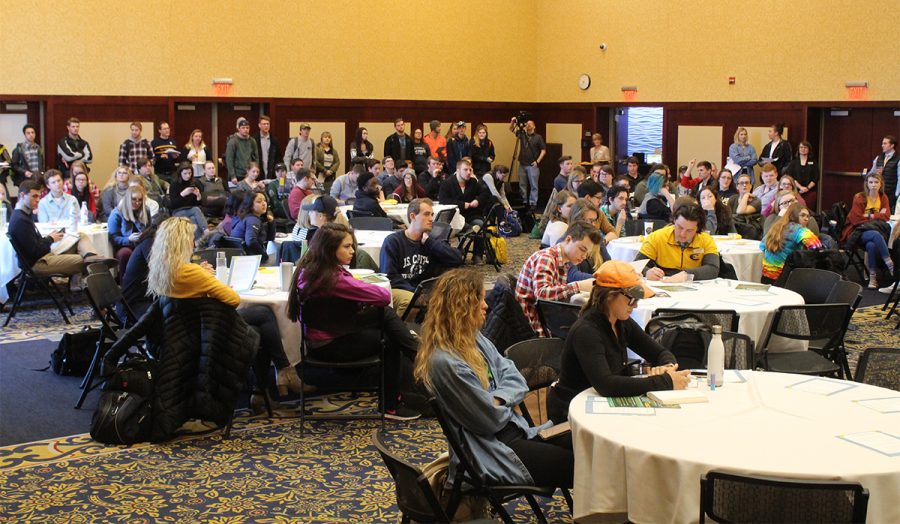Students share concerns about ordinance at Chancellor’s Roundtable
Thursday’s meeting gave students a chance to ask city officials about the Public Good Order ordinance
Photo by Kar Wei Cheng
The Chancellor’s Roundtable on Thursday opened a discussion between UW-Eau Claire students and city officials. Students were given the opportunity to ask questions about the proposed ordinance changes.
Students’ concerns and questions were the centerpiece of a discussion surrounding the proposed changes to the Public Good Order ordinance at the Chancellor’s Roundtable on Thursday.
“I think it’s important for students to be engaged in the matters that are affecting them,” said Joseph Abhold, the dean of students.
If passed by the Eau Claire City Council, the proposed changes to the ordinance would impact four major areas of the law concerning public disorder and intoxication, physical neighborhood disruption and motor vehicle restrictions. A fine for a violation could cost $295, including court fees.
The Roundtable followed a press release from UW-Eau Claire’s Student Senate that addressed the student leaders’ frustration with being left out of the proposal’s drafting process.
By noon on Thursday, the Dakota Ballroom of the Davies Student Center was abuzz with students: Every table was occupied. Some students stood at the back of the room.
At the front of the room sat Jenessa Stromberger, the assistant city attorney who drafted the legislation, Lieutenant Greg Weber and Deputy Chief Chad Hoyord of Eau Claire Police Department and Abhold.
Student inquiries fell into four main categories: Motor vehicle concerns, safety concerns, clarification about public intoxication and future implications of the legislation.
Students asked about the effect the proposal would have on late-night transportation.
The proposal’s goal is not to put an end to the use of late-night transportation, officials said. Rather, the ordinance would limit how many passengers can be dropped off in a residential area. Buses could still stop in business districts, and other services like Uber and Lyft are not restricted by the ordinance.
This proposed change is product of complaints heard from party hosts. Weber said when buses drop off riders at one house address, the party quickly becomes out of the host’s control.
“We’re getting calls where people in the buses all leave to go to one party,” Weber said.
Conversation flowed from transportation to safety dilemmas brought up by the legislation. Students cited late-night transportation restrictions as cause for worry surrounding safety. They said the discontinuation of shuttle services would endanger students by forcing them to walk at night.
“I’m wondering if the city has any plan, or potential plan, to put in any transit option at night for students and really anybody, due to the safety issues and safety concerns,” Hillary Smith, a student senator, asked.
Officials were not able to offer any plans for late-night transit in place of Right Way’s Blue Bus.
Thursday evening, Tom Klatt, the director of operations at Right Way Shuttle Incorporated, said “effective immediately,” the company will not offer their late-night Blue Bus transit option.
Klatt said Right Way was not included during formative discussion about the legislation even though the business will be affected if it passes. Specifically, he said it would be challenging for a bus driver to ensure that no more than 10 riders get off at one stop, as the proposal mandates.
“Until these concerns are addressed, with discussion and not an ordinance, I cannot continue to offer these (Blue Bus) services,” Klatt said.
Right Way’s other shuttling options will remain open.
Student Body President Katy McGarry said she was disappointed in Klatt’s decision to discontinue the Blue Bus services.
“I’m disappointed that the owner felt it had to go down that way,” McGarry said. “Student Senate, we’ve been really trying to actively engage our city councillors and talk to them about the process, work with them on the ordinance going forward, working on possible amendments, possible postponement of the vote. So it’s kind of disappointing he felt like he had to discontinue the service for students.”
Clarification about public intoxication was also addressed Thursday afternoon. The ordinance’s amendments allow officers to issue individuals heavily influenced by drugs or alcohol a citation if they are in a public space, including bars.
City officials said they realize this part of the ordinance holds some subjectivity but highlighted that police officers will look for individuals who could potentially become a risk to themselves or others.
“At the end of the day, we’re focused on that disorder when it becomes a danger to people,” Weber said.
Along the same lines, Weber said police are trained to prioritize safety over citations when confronted with the two.
“If someone’s got a legitimate (safety) issue,” Weber said, “we’ll deal with that first.”
Students also investigated the updated ordinance’s implications.
One student spoke about the effect the amendments would have on Eau Claire’s homeless population.
“I think that this is a way that will target the homeless population,” the student said.
Hoyord said the ordinance will allow officers to “educate” those who are loitering in public spaces. Even with the change, officers wouldn’t give people who are experiencing homelessness citations without cause.
Smith also expressed concern that the proposed ordinance changes would negatively impact people of color.
“Black men are stopped at three times the rate of white men and at a less productive rate,” Smith said. “So, I’m wondering if you have any concerns about this ordinance increasing the risk of racial profiling.”
Weber did not address any concern he had in his reply.
McGarry said she was happy with the number of students who turned out to speak with city officials. She said she was also pleased that city officials were able to attend.
“I was just glad we could have this conversation because it’s so important for students to voice their opinions in an open forum like that,” McGarry said.
On Monday, March 12, the Public Good Order ordinance will have a public hearing at the City Hall. Anyone can speak at the meeting or submit a letter of concern to be read. The City Council will vote on the legislation on March 13.

Neupert is a fourth-year journalism student at UW-Eau Claire. She is the executive producer of Engage Eau Claire on Blugold Radio Sunday. In her spare time, Neupert's working on becoming a crossword puzzle expert.











